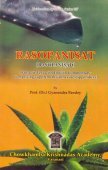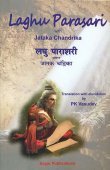Adhyaya, Adhyāya, Adhyāyam: 16 definitions
Introduction:
Adhyaya means something in Hinduism, Sanskrit, Marathi, Hindi. If you want to know the exact meaning, history, etymology or English translation of this term then check out the descriptions on this page. Add your comment or reference to a book if you want to contribute to this summary article.
Alternative spellings of this word include Adhyay.
In Hinduism
General definition (in Hinduism)
Source: Wisdom Library: Hinduismadhyāya is a Sanskrit term roughly meaning "lesson", "lecture", "chapter"
Source: WikiPedia: HinduismAdhyāya means "a lesson, lecture, chapter; reading"
Languages of India and abroad
Marathi-English dictionary
Source: DDSA: The Molesworth Marathi and English Dictionaryadhyāya (अध्याय).—m (S) pop. adhyā or adhyāva m A section, part, chapter.
Source: DDSA: The Aryabhusan school dictionary, Marathi-Englishadhyāya (अध्याय).—m A chapter, section, part.
Marathi is an Indo-European language having over 70 million native speakers people in (predominantly) Maharashtra India. Marathi, like many other Indo-Aryan languages, evolved from early forms of Prakrit, which itself is a subset of Sanskrit, one of the most ancient languages of the world.
Sanskrit dictionary
Source: DDSA: The practical Sanskrit-English dictionaryAdhyaya (अध्यय).—[i-bhāve ac]
1) Learning, study; remembrance.
2) = अध्याय (adhyāya), q. v.
Derivable forms: adhyayaḥ (अध्ययः).
--- OR ---
Adhyāya (अध्याय).—a. [i-ghañ P.III.3.21] (At the end of comp.) A reader, student, one who studies; वेदाध्यायः (vedādhyāyaḥ) a student of the Vedas; so मन्त्र° (mantra°)
-yaḥ 1 Reading, learning, study, especially of the Vedas; प्रशान्ताध्यायसत्कथा (praśāntādhyāyasatkathā) (nagarī) Rām.
2) Proper time for reading or for a lesson; °ज्ञाः प्रचक्षते (jñāḥ pracakṣate) Manusmṛti 4.12, see अनध्याय (anadhyāya) also.
3) A lesson, lecture; अधीयतेऽस्मिन् अध्यायः (adhīyate'smin adhyāyaḥ) P.III.3.122; so स्वाध्यायोऽध्येतव्यः (svādhyāyo'dhyetavyaḥ).
4) A chapter, a large division of a work, such as of the Rāmāyaṇa, Mahābhārata, Manusmṛti, Pāṇini's Sūtras &c. The following are some of the names used by Sanskrit writers to denote chapters or divisions of works :--सर्गो वर्गः परिच्छेदोद्घाताध्यायाङ्क- संग्रहाः । उच्छ्वासः परिवर्तश्च पटलः काण्डमाननम् । स्थानं प्रकरणं चैव पर्वोल्लासाह्निकानि च । स्कन्धांशौ तु पुराणादौ प्रायशः परिकीर्तितौ (sargo vargaḥ paricchedodghātādhyāyāṅka- saṃgrahāḥ | ucchvāsaḥ parivartaśca paṭalaḥ kāṇḍamānanam | sthānaṃ prakaraṇaṃ caiva parvollāsāhnikāni ca | skandhāṃśau tu purāṇādau prāyaśaḥ parikīrtitau) ||
--- OR ---
Adhyaya (अध्यय).—&c. See under अधी (adhī).
See also (synonyms): adhyayana.
--- OR ---
Adhyāya (अध्याय).—See under अधि (adhi).
See also (synonyms): adhyāpaka, adhyāpana.
Source: Cologne Digital Sanskrit Dictionaries: Shabda-Sagara Sanskrit-English DictionaryAdhyāya (अध्याय).—m.
(-yaḥ) 1. The section, or division of a book. 2. A chapter or lecture of the Vedas. E. adhi, iṅa to go, and ghañ aff. proper to be gone through or read.
Source: Cologne Digital Sanskrit Dictionaries: Benfey Sanskrit-English DictionaryAdhyāya (अध्याय).—i. e. adhi-i + a, m. 1. Reading, recitation. 2. The time when the sacred books ought to be read, [Mānavadharmaśāstra] 4, 102. 3. A section of a book, e. g. the subdivisions of the [Rāmāyaṇa], Mahābhārata Comp. An-, m. the time when the sacred books ought not to be read, [Mānavadharmaśāstra] 2, 106. Sva-, m. 1. perusal or study of the Vedas, [Mānavadharmaśāstra] 2, 105. 2. the Veda. 3. inaudible reading or muttering of prayers. Niḥsva-, i. e. nis -sva-, adj. not muttering prayers, [Harivaṃśa, (ed. Calc.)] 11187.
Source: Cologne Digital Sanskrit Dictionaries: Cappeller Sanskrit-English DictionaryAdhyāya (अध्याय).—[masculine] study, lesson, section of a book, chapter.
Source: Cologne Digital Sanskrit Dictionaries: Monier-Williams Sanskrit-English Dictionary1) Adhyāya (अध्याय):—[=adhy-āya] [from adhī] m. a lesson, lecture, chapter
2) [v.s. ...] reading
3) [v.s. ...] proper time for reading or for a lesson
4) [v.s. ...] ifc. a reader (See vedādhyāya), [Pāṇini 3-2, 1 [Scholiast or Commentator]]
Source: Cologne Digital Sanskrit Dictionaries: Goldstücker Sanskrit-English DictionaryAdhyāya (अध्याय):—[tatpurusha compound] m.
(-yaḥ) I.
1) A section of a book (f. i. of the Ṛgveda, Yajurveda, Aitareyabrāhmaṇa, Pāniṇis grammar &c.).
2) Reading, studying. E. i (iṅ) with adhi, kṛt aff. ghañ. Ii. One who reads or studies (in this sense only as the latter part of a compound; f. i. vedādhyāyaḥ one who reads the Veda). E. i (iṅ) with adhi, kṛt aff. aṇ.
Source: Cologne Digital Sanskrit Dictionaries: Yates Sanskrit-English Dictionary1) Adhyaya (अध्यय):—[adhya+ya] (yaḥ) 1. m. A chapter.
2) Adhyāya (अध्याय):—[adhyā+ya] (yaḥ) 1. m. A chapter.
Source: DDSA: Paia-sadda-mahannavo; a comprehensive Prakrit Hindi dictionary (S)Adhyāya (अध्याय) in the Sanskrit language is related to the Prakrit word: Ajbhāya.
[Sanskrit to German]
Sanskrit, also spelled संस्कृतम् (saṃskṛtam), is an ancient language of India commonly seen as the grandmother of the Indo-European language family (even English!). Closely allied with Prakrit and Pali, Sanskrit is more exhaustive in both grammar and terms and has the most extensive collection of literature in the world, greatly surpassing its sister-languages Greek and Latin.
Hindi dictionary
Source: DDSA: A practical Hindi-English dictionaryAdhyāya (अध्याय) [Also spelled adhyay]:—(nm) a chapter.
...
Kannada-English dictionary
Source: Alar: Kannada-English corpusAdhyaya (ಅಧ್ಯಯ):—
1) [noun] a learning by examining and analysing; a study.
2) [noun] a main division of a book; a chapter.
--- OR ---
Adhyāya (ಅಧ್ಯಾಯ):—
1) [noun] any of the major, separate parts into which a book or other piece of text is divided, usu. numbered or given a title; a chapter.
2) [noun] application of the mental faculties to the acquisition of knowledge; act or process of studying; a study.
3) [noun] a proper period for studying.
4) [noun] (in comp. as a suffix) one who studies or is studying.
Kannada is a Dravidian language (as opposed to the Indo-European language family) mainly spoken in the southwestern region of India.
See also (Relevant definitions)
Partial matches: Aya.
Starts with (+17): Adhyayaka, Adhyayan, Adhyayana, Adhyayana-anga, Adhyayana-bhatta, Adhyayanabhashya, Adhyayanadana, Adhyayanadanika, Adhyayanamadu, Adhyayanamamdira, Adhyayanamtaraya, Adhyayananiyama, Adhyayanapunya, Adhyayanasampradana, Adhyayanasamsthana, Adhyayanasamvritti, Adhyayanashale, Adhyayanashila, Adhyayanashilate, Adhyayanashile.
Ends with (+183): Abhranadhyaya, Acala upadhyaya, Acyutopadhyaya, Alamkaropadhyaya, Anadhyaya, Ankapashadhyaya, Anuvakadhyaya, Asanadhyaya, Ashtavargaphaladhyaya, Asvadhyaya, Aushadhakalpanadhyaya, Bahvadhyaya, Balarishtadhyaya, Bhagavatisutrasvadhyaya, Bhaktupadhyaya, Bhatt-opadhyaya, Bhattopadhyaya, Bhavadhyaya, Bhavaphaladhyaya, Candrakundalibhavadhyaya.
Full-text (+788): Anvadhyayam, Duradhyaya, Adhyayashatapatha, Traimsha, Shodashalakshana, Ashtadhyayi, Trishatatama, Adhyayika, Tasyashitiya, Adhyayopakarman, Catvarimsha, Saptadashan, Mayuracitraka, Dvishatatama, Catuhshashti, Barhicitraka, Aupasada, Trisaptatitama, Nakshatrabhakti, Trishashtitama.
Relevant text
Search found 99 books and stories containing Adhyaya, Adhy-aya, Adhy-āya, Adhyāya, Adhyāyam; (plurals include: Adhyayas, ayas, āyas, Adhyāyas, Adhyāyams). You can also click to the full overview containing English textual excerpts. Below are direct links for the most relevant articles:
The Linga Purana (by J. L. Shastri)
Chapter 55 - The mode of propitiating Śiva < [Section 2 - Pūrvabhāga]
Chapter 21 - The mode of Initiation (dīkṣā-vidhi) < [Section 2 - Pūrvabhāga]
Brahma Sutras (Ramanuja) (by George Thibaut)
Sutra 3.1.1 < [Third Adhyaya, First Pada]
Sutra 1.1.1 < [First Adhyaya, First Pada]
First Adhyaya, Second Pada (Introduction) < [First Adhyaya, Second Pada]
Satapatha-brahmana (by Julius Eggeling)
Kāṇḍa XI, adhyāya 7, brāhmaṇa 1 < [Eleventh Kāṇḍa]
Kāṇḍa XI, adhyāya 8, brāhmaṇa 1 < [Eleventh Kāṇḍa]
Introduction to volume 1 (kāṇḍa 1-2) < [Introductions]
Baudhayana Dharmasutra (by Georg Bühler)
The Sacrifices of Rajasuya, Vajapeya and Ashvamedha (study) (by Aparna Dhar)
Contents of the Brāhmaṇas of the Yajurveda < [Chapter 1 - A brief outline of the Brāhmaṇa Literature]
Contents of the Brāhmaṇas of the Ṛgveda < [Chapter 1 - A brief outline of the Brāhmaṇa Literature]
Contents of the Brāhmaṇas of the Sāmaveda < [Chapter 1 - A brief outline of the Brāhmaṇa Literature]
Rivers in Ancient India (study) (by Archana Sarma)
2(a). The river Sarasvatī in the Vājasaneyī-saṃhitā (Introduction) < [Chapter 2 - The Rivers in the Saṃhitā Literature]
4. The river Sindhu in the Ṛgveda-saṃhitā < [Chapter 2 - The Rivers in the Saṃhitā Literature]
Related products


